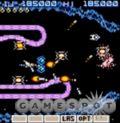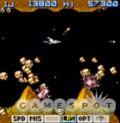Konami's Gradius, which hit arcades in 1985, was revolutionary for coupling lightning-paced, side-scrolling gameplay with an emphasis on strategy. The game's move to the NES--where it was one of the first side-scrolling space shooters on the platform--only widened its considerable popularity. Several sequels later, the original game has made its way to mobile. The sprites may be smaller, but the spirit of this arcade classic, as well as its original level designs, remains intact.

While Gradius may be the progenitor of all modern shooters, it must be asked whether the game still has something to offer today's mobile audience. The answer is an unequivocal "Yes," although its intense difficulty level may alienate casual audiences.
Gradius is a pure shooter, and it doesn't have much of a premise. The basic goal is to destroy an alien mothership, by first battling through a protectorate of robotic and organic baddies to earn the opportunity to do so. Gradius is part of a lost breed of game in which rote level memorization is as important to a player's success as his or her actual skill. Originally designed to separate you from your quarters, this shooter can only be beaten by those who take the time to play each level until every pixel of it is familiar.
Managing the game's unique power-up system takes strategic planning, however. Many of the enemies you torch will drop a generic energy crystal that advances a cursor at the bottom of the screen from one possible power-up to the next. The idea is to wait until you've accrued enough energy crystals to get a power-up you're satisfied with. Then you select it, which moves your power-up cursor back to square one. You can garner multiple copies of each upgrade, and some combinations are more useful than others.
Additionally, the memorable "option" upgrade will manifest an indestructible copy of your ship (and its arsenal) that will fight alongside you. You may have up to four of these helpers at a time--all blasting away. If you manage to gather a fair amount of power-ups without dying (which resets your artillery), having this sort of support unit will make you a force to be reckoned with. For this reason, Gradius is all about achieving momentum early on and maintaining it throughout your assault. It's incredibly rewarding when you're playing well, and it's equally punishing when you're not--even on the "easy" setting.
Seasoned players will appreciate the mobile version as a worthy adaptation of the original. While not arcade-perfect--from an audiovisual standpoint--it's not so far off. It's clear that the game's sprites are smaller, less detailed, and less colorful than their NES and arcade counterparts, but they're also clear and perfectly functional. The sound is the aspect of the game that is most evocative of the original's experience, and it also represents some of the best offered on Sprint Vision, which is often notoriously lacking in the sound category.

Surprisingly, the game controls pretty well--at least on the Sanyo 8100's navigation pad. Chording is thankfully enabled, so you won't have to use the keypad just to get diagonal movement. Control responsiveness is paramount to a fast-twitch offering like this. Thankfully, the game meets this need. Gradius can be frustrating, because it's legitimately difficult (not because it presents poor control).
The mobile Gradius is every bit as addictive and challenging as its predecessors. The old level designs are intact, as is the essential experience. Even judged without a healthy nostalgia buffer, the game is one of the best shooters on mobile, second only to Series 60 titles such as Siberian Strike or Dragon Fire 2. As such, Gradius makes an excellent addition to any Vision user's game library.